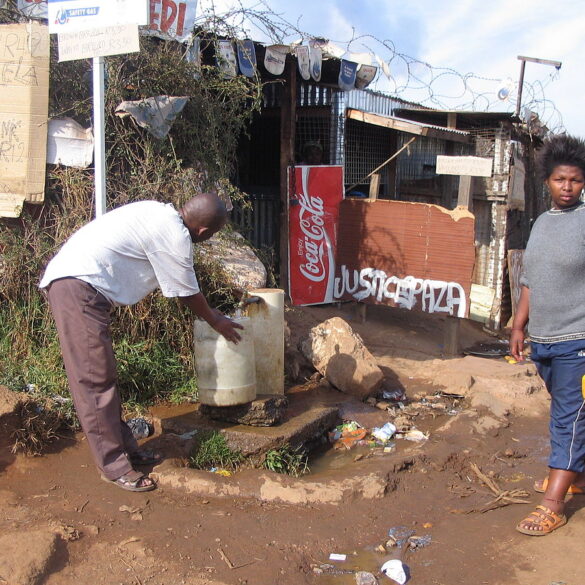Table of Contents
Water Scarcity as a Global Security Challenge
Water scarcity has emerged as a critical global challenge, posing significant threats to both human well-being and global security. As the demand for freshwater continues to rise due to factors such as climate change and population growth, the availability of clean water resources is becoming increasingly limited.
This article aims to shed light on the multifaceted dimensions of water scarcity as a global security concern. By examining its implications for political stability, socio-economic development, and regional conflicts, we can better comprehend the urgent need for effective management and cooperation to ensure a sustainable and secure future for all.
1. Introduction: Understanding the Global Significance of Water Scarcity
1.1 The Importance of Water in Our Lives
Water is the essence of life. We rely on it for drinking, sanitation, agriculture, and industrial processes. It is the elixir that sustains us humans, as well as the planet we inhabit. However, the availability of freshwater is not unlimited. In fact, water scarcity is becoming an increasingly pressing global challenge.
1.2 Defining Water Scarcity and its Implications
Water scarcity occurs when the demand for water exceeds the available supply in a particular region. It can be caused by a combination of factors such as droughts, pollution, inefficient water management, and climate change. The implications of water scarcity go far beyond parched throats; they extend to economic stability, political security, and social well-being. Addressing this challenge is crucial to ensure a sustainable and secure future for all.
2. The Implications of Water Scarcity for Global Security
2.1 Water as a Catalyst for Conflict
While water may seem like a basic necessity, it has the potential to become a catalyst for conflicts at various levels. Access to water sources, especially in regions facing scarcity, can lead to tensions between communities, states, or even nations. Disputes over shared rivers, transboundary water management, and access to groundwater can escalate into conflicts that threaten regional stability.
2.2 Impacts on Political Stability and National Security
Water scarcity can also have significant impacts on political stability and national security. In regions heavily dependent on agriculture, water scarcity can lead to food insecurity, unemployment, and increased poverty levels. These socio-economic challenges can amplify existing grievances, fostering social unrest and political instability. Moreover, water scarcity can ignite mass migrations, adding pressure to already strained resources and potentially causing social and political tensions between host and migrant communities.
3. Exploring the Causes of Water Scarcity: Climate Change and Population Growth
3.1 Climate Change and its Effects on Water Availability
Climate change is a key driver of water scarcity. Rising temperatures, changing precipitation patterns, and more frequent extreme weather events like droughts and floods can all disrupt the natural water cycle, making it harder to predict and manage water availability. It is crucial to address climate change mitigation and adaptation strategies to safeguard water resources for future generations.
3.2 Population Growth and Increased Water Demand
As the global population continues to grow, so does the demand for water. Rapid urbanization, industrial expansion, and changing consumption patterns have led to increased water usage. This growing water demand puts additional strain on already limited freshwater resources, exacerbating water scarcity challenges. Balancing population growth with sustainable water management practices is essential to secure a water-rich future.
4. Water Scarcity and its Impact on Socioeconomic Stability
4.1 Economic Consequences of Water Scarcity
Water scarcity has significant economic consequences. In regions heavily reliant on agriculture, reduced water availability can lead to decreased crop yields, lower agricultural productivity, and increased food prices. The industrial sector also suffers, as businesses reliant on water may face disruptions in production and increased operational costs. These economic impacts can have far-reaching consequences, affecting livelihoods, trade, and overall economic stability.
4.2 Social Implications of Water Shortages
Water shortages can have profound social implications. Women and children, who are often responsible for water collection in many communities, bear the brunt of the burden when water sources are scarce. The time and effort spent fetching water can limit educational opportunities, perpetuate gender inequalities, and hinder overall socio-economic development. Access to clean and safe water is not only a matter of basic human dignity but also a catalyst for social progress.
In conclusion, water scarcity is a complex and multifaceted challenge that affects various aspects of global security, including political stability, economic well-being, and social progress. Addressing this challenge requires a multi-pronged approach, including sustainable water management practices, climate change mitigation, and population control measures. By prioritizing water security, we can pave the way for a more resilient and harmonious future.
5. Assessing Water Scarcity's Role in Regional Conflicts
5.1 Water Conflicts: Case Studies and Examples
Water scarcity is not just a theoretical concept; it has played a significant role in real-life conflicts around the world. From the Middle East to Sub-Saharan Africa, numerous case studies highlight how water scarcity has fueled regional tensions and even armed conflicts.
In regions like the Nile River basin, disputes over water resources have emerged between countries such as Egypt, Sudan, and Ethiopia. These conflicts arise from competing demands for irrigation, hydropower, and drinking water, often exacerbating political and economic tensions between nations.
Similarly, in the Jordan River basin, countries like Israel, Jordan, and Palestine have long been entangled in water-related disputes. The limited availability of freshwater resources in this area has heightened regional tensions and complicated peace negotiations.
Water scarcity is not just an environmental issue; it is deeply intertwined with political dynamics and power struggles. The control and allocation of water resources can become a tool for exerting dominance and influence, particularly in regions where water is scarce.
Political leaders have often used water scarcity as a means to rally support and stoke nationalist sentiments. Water-related disputes can easily escalate into full-blown conflicts if not managed carefully. Therefore, understanding the political dimensions of water scarcity is crucial for finding sustainable solutions and preventing further escalation of tensions.
6. Water Diplomacy: Addressing Water Scarcity Through Cooperation and Collaboration
6.1 International Efforts and Agreements
Recognizing the global significance of water scarcity, international efforts have been made to address this challenge through diplomacy and cooperation. Organizations such as the United Nations and the World Bank have facilitated dialogues and negotiations to promote collaboration among nations sharing transboundary water resources.
Various agreements, such as the United Nations Watercourses Convention and the Helsinki Rules, aim to establish frameworks for the joint management and equitable sharing of water resources. These efforts emphasize the importance of diplomatic solutions and peaceful cooperation in addressing water scarcity as a global security challenge.
6.2 Promoting Cross-border Cooperation for Water Management
To effectively manage water scarcity, countries must move beyond traditional notions of national sovereignty and embrace cross-border cooperation. Collaborative water management initiatives, such as joint infrastructure projects or information-sharing platforms, can help build trust and foster peaceful relations among nations facing shared water challenges.
By promoting dialogue and cooperation, countries can develop sustainable strategies for water allocation, conservation, and equitable access. Encouraging cross-border cooperation in water management is not only essential for ensuring water security but also for building broader regional stability and peace.
7. The Role of Technology and Innovation in Mitigating Water Scarcity
7.1 Advancements in Water Conservation and Efficiency
In the face of water scarcity, technology and innovation have a pivotal role to play. Advancements in water conservation and efficiency hold great promise for mitigating the impacts of water scarcity and ensuring sustainable water management.
From low-flow faucets and toilets to smart irrigation systems, various technologies can help minimize water wastage and improve overall efficiency. Additionally, modern farming practices, such as precision agriculture and drip irrigation, optimize water usage in agricultural sectors, reducing water stress on local ecosystems.
7.2 Emerging Technologies for Water Desalination and Purification
Another area of technological innovation lies in water desalination and purification. As freshwater sources become increasingly scarce, technologies like reverse osmosis and solar-powered desalination offer potential solutions for converting seawater into freshwater.
Furthermore, innovative purification techniques, like advanced filtration systems and decentralized water treatment plants, can provide safe drinking water in remote and water-stressed regions. Continued investment in research and development of these technologies is vital for meeting the growing water demands of a rapidly changing world.
8. Conclusion: Building a Sustainable and Secure Future
Addressing water scarcity as a global security challenge requires a comprehensive approach that combines political, diplomatic, and technological solutions. By understanding the role of water scarcity in regional conflicts, promoting cross-border cooperation, and leveraging technology and innovation, we can build a sustainable and secure future.
It is imperative for nations to prioritize water diplomacy and collaborate on shared water resources, utilizing international agreements and frameworks. Simultaneously, investing in technological advancements for water conservation, efficiency, desalination, and purification will help alleviate the pressures of water scarcity.
By embracing these strategies and working together, we can mitigate the risks associated with water scarcity, foster peace and stability, and ensure access to clean and sufficient water for future generations. Let's raise a glass (of water) to a sustainable and secure future!
8. Conclusion: Building a Sustainable and Secure Future
In conclusion, addressing water scarcity is not just a matter of environmental concern but a critical global security imperative. The impacts of water scarcity on socio-economic stability, regional conflicts, and political dynamics are far-reaching and demand immediate attention. By fostering international cooperation and investing in innovative technologies for water management, we can mitigate the risks associated with water scarcity and pave the way for a more sustainable and secure future. It is through collective action and a shared commitment to responsible water governance that we can ensure access to clean water for current and future generations.
FAQ
1. What is water scarcity and why is it a global security challenge?
Water scarcity refers to the situation when there is not enough freshwater available to meet the demand of a region or population. It becomes a global security challenge because it can lead to political instability, conflicts over water resources, and hinder socio-economic development. As water scarcity intensifies due to climate change and population growth, it poses a threat to global security by exacerbating existing tensions and triggering new conflicts.
2. How does water scarcity impact regional conflicts?
Water scarcity can be a significant factor in regional conflicts. When water resources become scarce, competition for access and control over these resources can escalate tensions between neighboring regions or countries. Disputes over shared rivers, lakes, or groundwater reservoirs can lead to diplomatic conflicts, and in some cases, even result in armed conflicts. Therefore, understanding the role of water scarcity in regional conflicts is crucial for promoting peace, stability, and cooperation.
3. What measures can be taken to address water scarcity?
Addressing water scarcity requires a multi-faceted approach. It involves implementing sustainable water management practices, such as promoting water conservation and efficiency, investing in infrastructure for water storage and distribution, and adopting innovative technologies for water desalination and purification. Additionally, fostering international cooperation through water diplomacy, sharing best practices, and establishing treaties and agreements can facilitate effective management and equitable distribution of water resources.
4. How can individuals contribute to mitigating water scarcity?
Individuals can play a vital role in mitigating water scarcity through simple yet impactful actions. Conserving water in daily activities, such as using water-efficient appliances, fixing leaks, reducing water consumption in households, and practicing responsible irrigation in gardens, can make a significant difference. Additionally, raising awareness about the importance of water conservation, supporting initiatives for clean water access in developing regions, and advocating for sustainable water policies can contribute to long-term solutions in addressing water scarcity.




